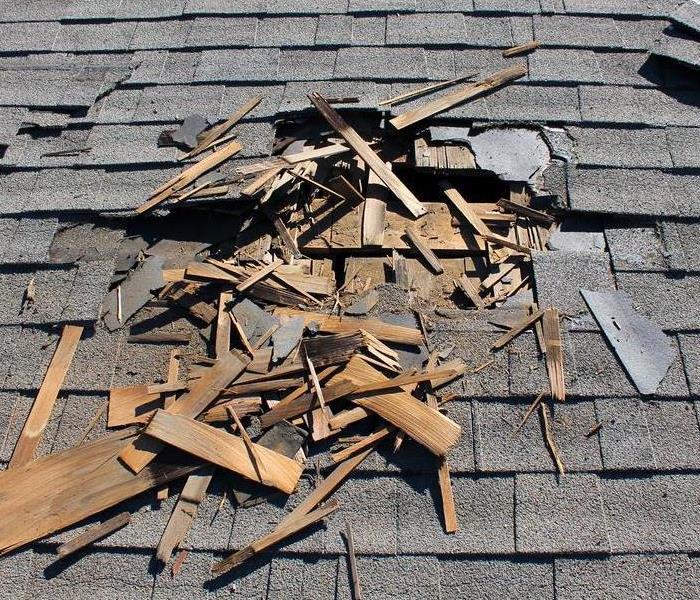Six Tips To Protecting Your Home From Water Damage
2/24/2023 (Permalink)
Water is one of the most dangerous threats to your home. It can cause thousands of dollars worth of damage in just a matter of hours and can even lead to mold growth. By taking a few simple steps, you can make sure your home stays safe from water damage every day and throughout the year.
Inspect your roof.
Check your roof for leaks. Roofs are one of the most common places for water damage to occur, so it's important to regularly inspect yours for signs of trouble. Look for damage that may have occurred due to a leaky roof or poor ventilation in your attic, such as mold growth on walls and ceilings near vents and light fixtures.
Inspect insulation around pipes and vents in the attic or crawl space; if it has become wet and moldy, remove it immediately (and replace it with new insulation). Look at wood framing members like joists that support floors above grade level; these should be inspected annually by a qualified professional who can determine whether they need repair or replacement due to rot or decay caused by moisture intrusion into the home's structure."
Check your gutters.
Gutters are a crucial part of preventing water damage in your home, so it's important to keep them clean. At least twice a year, check for clogs and blockage, if you find any, clean them out with a wire brush or cleaning tool designed specifically for this purpose (a stiff wire brush is ideal). If you don't have gutters but think they might be right for you and your home, consider installing them during the next rainy season.
Test your sump pump.
Test your sump pump. Sump pits are designed to collect water and then pump it out of your house, but sometimes they don't work as well as they should. To test yours, first, check the water level in the pit. If there's more than that or if you can't see any water at all, there may be a problem with your sump pump (or possibly even something blocking its intake). Then turn on and off your battery backup system while watching for any changes in water levels--if nothing happens when you turn off the power, this could mean that something has gone wrong with either your battery backup system or another part of its wiring setup. Finally, try turning off the power again while listening closely: if you hear gurgling sounds coming from inside one side of the house followed by loud clanking noises coming from beneath it over time (as though someone was emptying buckets full of rocks into an aquarium), then chances are good that there's something wrong with these pipes too!
Clean dishwasher, fridge, and washing machine hoses.
Dishwashers, fridges, and washing machines have a lot of moving parts that can get clogged with debris over time. This will lead to water leaks that may damage your home's foundation or cause mold growth inside the appliance itself. To prevent this from happening, clean all three appliances' hoses at least once per year by running hot water through them for several minutes (or until it runs clear). If you can't clean them yourself, consider hiring someone who has experience working with these appliances (like an HVAC technician) instead of trying to do it yourself.
Make sure hose bibs are insulated.
Hose bibs are the valves that control water flow in your home. They're often exposed to the elements, which means they can freeze in cold weather, crack in hot weather and rust during wet seasons. If your hose bibs aren't properly insulated, it's a good idea to replace them with ones that have built-in insulation or wrap them with foam pipe insulation before winter sets in. This will help keep them from freezing and bursting open under pressure when you turn on your sprinklers next spring!
Inspect the exterior of your home.
Inspect the exterior of your home. Check for cracks in the foundation, walls, and windowsills. Look for leaks around pipes or water heaters. Check all the sinks and faucets to ensure no small leaks that could potentially turn into larger water damage. Check for stains on ceilings that may indicate water damage caused by a leaky roof or plumbing system.
Water damage can happen at any time, so regular maintenance is the best way to protect your home. Inspect your roof, gutters, sump pump, and other exterior areas for leaks or signs of damage. Water damage can be a big problem for your home and your family. It's important to take steps to protect yourself against water damage by making sure that your home is properly insulated and maintained. If you suspect a water loss in your home give SERVPRO a call today!





 24/7 Emergency Service
24/7 Emergency Service
